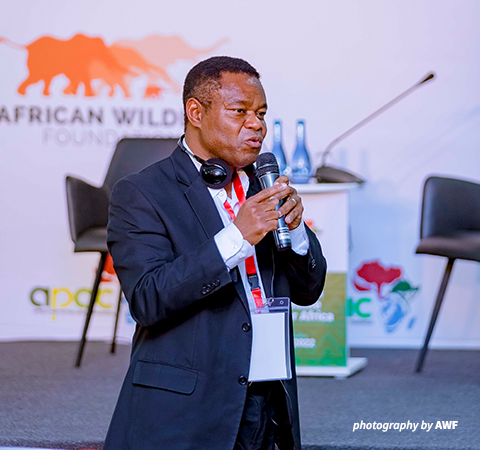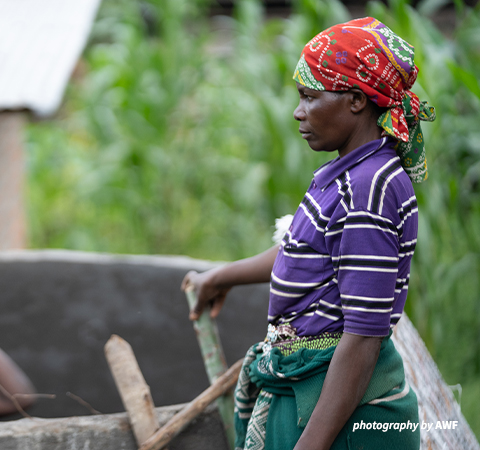What does success for Africa look like at COP15?

African Wildlife Foundation’s Vice President, Global Leadership, Frederick Kwame Kumah.
According to an OECD study, the average abundance of species population has declined by 44% globally since 1970. Recent expert research has assessed the impacts of climate change on ecosystems, biodiversity, and human communities, finding that our planet is in a state of emergency—and the pivot point lies within the next 7 years.
As African Wildlife Foundation’s Vice President of Global Leadership, Frederick Kwame Kumah, kicks off AWF’s engagement at the 15th Meeting of the Convention on Biological Diversity (CBD COP15) this week, he shares the key preparations and milestones AWF has achieved in collaboration with strategic partners such as the African CSOs Biodiversity Alliance (ACBA). He also shares insight on what a successful Conference of Parties would look like as the world goes into the implementation process of the Post-2020 Global Biodiversity Framework.
What is biodiversity?
Biodiversity is the sum of all life on Earth at a genetic, species, and ecosystem level. Africa is a biodiverse continent, estimated to host more than a quarter of the world’s biodiversity. And many of these are endemic—that is, they are only found in Africa and nowhere else in the world. Biodiversity in Africa includes iconic terrestrial and aquatic species of flora and fauna, such as elephants, lions, rhinos, gorillas, whales, sharks, turtles, cycads, and baobab trees.
Why is biodiversity important?
This diversity forms the basis of life, providing ecosystem services that we human beings need for survival, such as provisional services that provide us with our food, medicines, and—most importantly—water. We cannot overlook the regulating services that biodiversity provides to create an ecological balance through processes such as pollination and even pest control. The intricacies of biodiversity exist in everything we do and define who we are as a people.
Biodiversity provides basic services for everyday life. Beyond that, biodiversity contributes significantly to our economies through sectors such as ecotourism, which is a significant part of AWF’s work across biodiversity-rich regions. Consider Rwanda and Uganda, where we have collaborated with local communities through the respective government development agencies to set up ecolodges that provide significant financial benefits to the communities while living in harmony with nature.

Frederick Kwame Kumah AWF's Vice President Global Leadership.
How can we stop biodiversity loss?
Biodiversity is crucial for humanity’s survival, and the well-documented decline needs to be treated with urgency and addressed through a whole-of-society approach. Biodiversity and drivers of its loss are cross-boundary in nature. For instance, birds migrate across continents in search of food and water in different seasons. Also, activities in one country can be the cause of biodiversity loss in a neighboring country. Stopping the loss, therefore, requires cooperation among countries and continents.
AWF is consistently working to accelerate transboundary collaborative programs that are inclusive and locally led across the region. We are strongly driven by the fact that IPLCs [or Indigenous Peoples and Local Communities] have a long history of living in harmony with nature and protecting the areas they inhabit. There is a lot to learn from them, and they are crucial in the fight against biodiversity loss.
Over 2,000 global leaders convened from different constituencies—from our highest leaders to our civil society organizations, the private sector, youth and Indigenous groups, and everything in between—at the Africa Protected Areas Congress (APAC) held in July 2022 in Kigali, Rwanda. The congress provided key enabling mechanisms that would accelerate the implementation of the Global Biodiversity targets within the Post-2020 Framework.
Additionally, the African Union Agenda 2063 recognizes the role of nature in the continent’s development. In 2013, the AU party states established the Maputo Convention on the Conservation of Nature and Natural Resources in a bid to scale up the implementation of National Biodiversity Action Plans in a measurable and sustainable manner. The action to amplify this even further should be at the center of Africa’s commitments coming from COP15.
Why is COP15 important?
Back in 2010, the CBD adopted the 2050 vision of “Living in harmony with nature.” This vision was set to be achieved through the implementation of decade-long strategic plans, such as the 2011-2020 strategic plan, which was widely known for its Aichi Biodiversity Targets.
The 2011-2020 strategic plan has reached its deadline, and world leaders are now negotiating the Post-2020 Global Biodiversity Framework to advance the work of the Convention for the next decade. Therefore, leaders at COP15 expect to adopt the Post-2020 GBF, in which Africa has been very vocal on the enabling environment that we need to achieve these targets—learning from the past Aichi targets' slow and unsuccessful implementation.
The Convention on Biological Diversity (CBD) is one of the few Multilateral Environmental Agreements that has 196 countries as signatories with the goal of uniting these countries for the good of the planet. Every country has its own National Strategic Biodiversity Action Plan, better known as NBSAPs. Every two years, the countries meet to discuss the key milestones, gaps, and opportunities that need to be scaled up to achieve success.
This year, it is different. The countries are gearing up to set the targets that will inform their NBSAPs for the next seven years. Thus, the indicators of success need to be attainable and, most importantly, measurable.
What would be a good COP15 outcome for Africa?

Biodiversity provides basic services for everyday life.
The COP15 agenda includes several issues that are highly important for Africa. Issues such as area-based conservation targets, sustainable use of natural resources, the role of businesses in reversing biodiversity loss, strengthened means of implementation to include commensurate finance, capacity building and effective monitoring and reporting, and the inclusion of youth, women, and Indigenous peoples and local communities, just to mention a few.
A good COP15 outcome for Africa will factor in the following recommendations, which negotiators have been pushing over the past few years, for the Post-2020 Global Biodiversity Framework:
1. Ensures that area-based conservation is implemented through a human rights-based approach.
It is important to note that Target 3 of the Post-2020 GBF calls for protecting 30% of the earth by 2030. However, irrespective of which percentage of protection parties agree on at the COP, this target must ensure that continued protection is in accordance with the right of free, prior, and informed consent of IPLCs and remains in line with country priorities, capacities, and contexts.
2. Protects the right to sustainably use natural resources.
Undeniably, many African communities rely directly on natural resources for food, medicine, economic activities, and other immediate needs. Sustainable use, as articulated in Target 5 of the proposed framework, is fundamental to meeting the basic and development needs of Africans and must not be limited to customary use.
3. Ensures the effective engagement and rights of Youth, Women, and IPLCs.
In Africa, young people below the age of 35 make up about 75 percent of the population and are the main labor force. It is imperative to acknowledge that 80 percent of biodiversity is currently found in areas either owned, managed, or inhabited by IPLCs; thus, the framework must respect their rights, ensure their inclusion, and engage them more deliberately.
4. Keeps businesses accountable for the damage they cause to biodiversity.
Businesses at large have disproportionate impacts on biodiversity. Negotiators recommend that COP15 adopt a strong target 15, requiring governments to develop regulatory frameworks and guidelines for businesses to report on their impact on biodiversity and minimize any adverse impacts of their activities.
5. Closes the biodiversity financing gap and ensures that funding gets to the ground.
AWF has reiterated several times over the past few years that the biodiversity financing gap is growing wider by the day. It is currently estimated at USD $700 billion per year. Many agree that successful implementation of the Post-2020 GBF relies largely on the availability of financial resources and ensuring delivery to local actors. Target 19 of the Post-2020 GBF must then aim to not only set numbers that are commensurate to the ambition of the framework but also articulate the key steps towards collating, disbursing, and monitoring the funds secured.
Additionally, we must strengthen effective capacity building, knowledge management, monitoring, and reporting system—these steps are critical to the success of COP15.